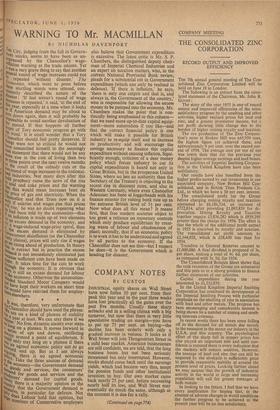WARNING TO Mr. MACMILLAN
By NICHOLAS DAVENPORT
fun? City, judging from the fall in Govern- !neat stocks, seems to have been as un- !alpressed by the Chancellor's wage- !aflation warning as the trade unions. Yet it was a very grave thing to say that another paeral round of wage increases could not he repeated 'without disaster.' The economist, which went to press before billese startling words were uttered, con- d'e,aiently described th nature of the ;usaster 'lf last winter's round of wage this is repeated,' it said, 'at the end of
"s Year, especially at a time when it looks
,7 If American demand may be about to in down again, then it will probably be 11, Possile to avoid another devaluation of ge Poubnd. If that happens all further ha ik lies of. Tory economic progress go with wind.' It is small wonder that a Tory ik4neellor should feel pretty desperate. If 4t .eIngs were not so criti he would not rash committed himselfcal to the seemingly
statement that there would not be any
more rise in the cost of living than two cir three points over the next twelve months js the result of the subsidy cuts or the i.sst round of wage increases in the national- ksed industries. Not many days after this uola ;11 kl prophecy came the news of the rise 11 Coal and coke prices and the warning that this would mean increases later on cl! Price of gas and electricity, When the obgiancellor said that 'from now on it is li,",11,Y if salaries and wages rise that prices h,,rise.' he was no doubt repeating what If` 'lad been told by the economists—that On inflation is made up of two elements (it); art excess demand in the economy, and C) a wage-induced wage-price spiral, then qothe excess demand is eliminated by 1'4; disinflation (as the Chancellor t:tiY claims), prices will only rise if wages lb on rising ahead of production. In theory oe,t is correct but in practice the excess beland is not immediately eliminated just 4Use sufficient cuts have been made on 4Per r he.t takes time for the cuts to work th.c'tigh the economy. It is obvious that 14-trhe is still an excess demand for labour N.11" economy. Otherwise the automation- 40, Lied Standard Motor Company would bvi have kept their workers on short time 41: Would have rele;.sed them for employ- Elt elsewhere. 11 the chance therefore, very unfortunate that
W l I or should have used the phrase:
for are on a kind of plateau of stability qi0 Year at least. We can stay there if we so ?e.' No free, dynamic society ever stays a ,211,13 on a plateau. It moves forward in ahy'rles of ups and downs, oscillating co:,Ys around a point of equilibrium. It Was u only stay long on a plateau if there to an agreed economic policy not .to go 418`vtard and up. But as I am always 0(4'4, there is no agreed economic 14 tEY. Take the three sources of demand forue economy—the Government demand cletil goods and services, the consumers' Drort4nd for goods and services and the tli.„11eers' demand for capital goods. cousj there is a majority opinion in the exceutrY that the Government demand is ,41,,s.,tve, in particular for defence. Not does Labour hol tat opinion, but 8e numbers of Conservative t employers
also believe that Government expenditure is excessive. The latest critic is Mr. S. P. Chambers, the distinguished deputy chair- man of Imperial Chemical Industries and an expert on taxation matters, who, in the current National Provincial Bank review, pleads for a substantial cut in Government expenditure (which can only be realised in defence). 'If there is inflation,' he says, 'there is only one culprit and that is, and always is, the Government of the country,' who is responsible for allowing the excess money to be pumped into the economy. Mr. Chambers makes the point that is con- tinually being emphasised in this column— that we need more up-to-date capital equip- ment—more automation if you like—and that the correct financial policy is one which will make it possible for British industry to re-equip itself and to increase its productivity and will encourage the savings necessary to finance this capital expenditure without causing inflation. Signi- ficantly enough, criticism of a dear money policy which forces industry to cut its capital expenditures is heard not only in Great Britain, but in the prosperous United States, where no less an authority than the Secretary of the Treasury is objecting to the recent rise in discount rates, and also in Western Germany, where even Chancellor Adenauer has been at loggerheads with his finance minster for raising bank rate up to the extreme British level of 5+ per cent. Now what does all this mean? It means first, that free modern societies object to too great a reliance on monetary controls which only produce equilibrium by creat- ing waste of labour and obsolescence of plant; secondly, that if an economic policy is to work it has to be understood and agreed by all parties to the economy. If the Chancellor does not see this—but I suspect he does—it is the Government which is heading for disaster.


































 Previous page
Previous page